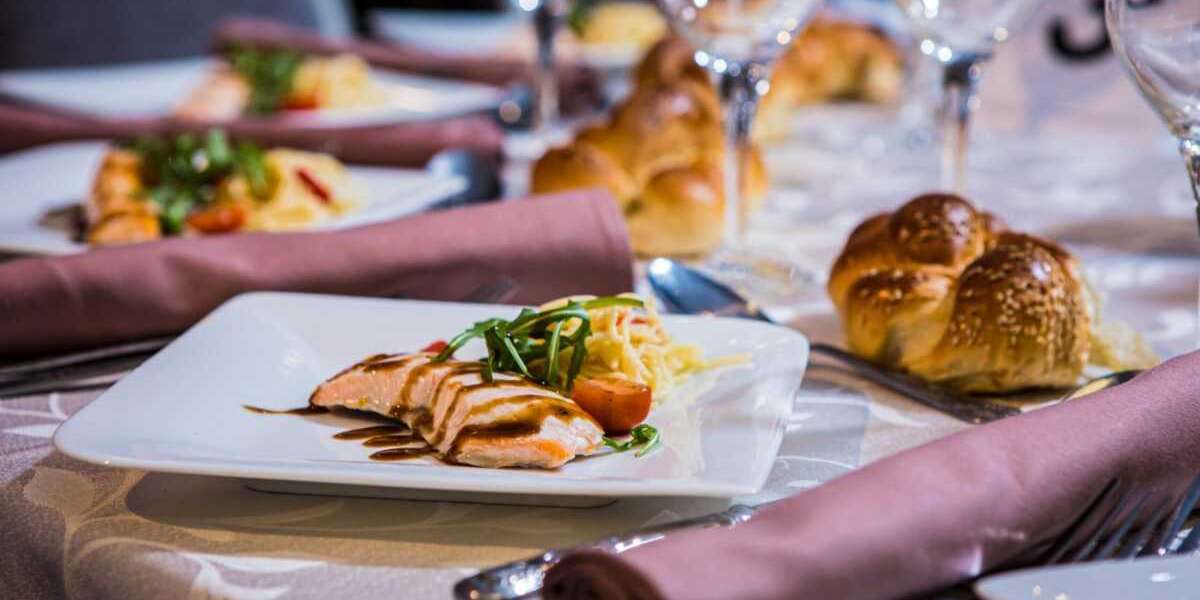Food is one of the most memorable parts of any wedding. Guests may not remember the exact flowers or décor, but they will always remember what they ate. A thoughtful wedding catering menu sets the mood, keeps guests happy, and turns the celebration into a shared experience around the table.
The good news is that planning your wedding menu does not have to feel overwhelming. By mixing classic favorites with modern flavors and keeping dietary needs in mind, you can create a meal that feels personal and enjoyable for everyone. This guide walks through menu ideas, serving styles, and planning tips to help you build the perfect wedding catering menu.
Why the Wedding Menu Matters
Your menu sets the tone for the reception. A plated dinner brings elegance and structure, while a buffet or family-style meal feels more relaxed and social. Beyond the serving style, the food itself is a reflection of you as a couple. Love comfort food? Add a playful twist to a classic dish. Prefer fresh, seasonal flavors? Build your menu around what’s in season. Whatever you choose, your menu becomes part of the story of your day.
Classic Wedding Catering Menu Staples
Some dishes remain timeless because they appeal to a wide range of guests. If you want to keep things simple and crowd-friendly, these classics are a solid foundation:
Appetizers: Mini quiches, bruschetta, shrimp cocktail, cheese platters
Salads: Caesar, mixed greens with vinaigrette, spinach salad with seasonal toppings
Proteins: Roasted chicken, beef tenderloin, salmon, lamb
Sides: Mashed potatoes, roasted vegetables, rice pilaf, pasta
Desserts: Wedding cake, cupcakes, fruit tarts, cheesecake bites
These dishes are familiar, comforting, and easy to enjoy, no matter what serving style you choose.
Modern Wedding Menu Ideas
If you want to move past tradition and add some excitement, there are plenty of creative options that make the meal stand out.
Interactive stations: Taco bars, pasta stations, sushi rolls made to order
Seasonal dishes: Menus built around local, fresh produce
Comfort foods with a twist: Mini sliders, gourmet mac and cheese, chicken and waffles
Fusion menus: Blending two cuisines to reflect family heritage or personal favorites
These ideas bring energy to the meal while still being approachable for guests.
Plated vs Buffet vs Family-Style
The serving style matters just as much as the food itself.
Plated dinners: Formal and elegant, with each guest served individually. Works well for traditional weddings but requires choosing dishes in advance.
Buffet style: Guests help themselves from a spread. This is relaxed, flexible, and great for mingling.
Family-style: Large platters are shared at each table. This creates a cozy, communal feel but may need more table space.
Think about the mood you want and choose the style that best matches the flow of your reception.
Vegetarian, Vegan, and Dietary-Friendly Options
Weddings today often include guests with different dietary needs, and it’s important to make sure everyone feels included. A few thoughtful menu additions can make a big difference.
Vegetarian: Grilled vegetable lasagna, mushroom risotto, stuffed peppers
Vegan: Lentil stew, roasted cauliflower steak, plant-based pasta
Gluten-free: Quinoa salads, grilled proteins, rice-based sides
Dairy-free: Olive oil dressings, sorbets, dairy-free desserts
Labeling these dishes clearly on menus or buffets makes it easy for guests to choose without worry.
Drinks to Complement the Menu
Beverages are the finishing touch to your menu.
Cocktail hour: Signature drinks, wine, and light appetizers
Dinner service: A selection of wines, sparkling water, and non-alcoholic options
Dessert and toast: Champagne, coffee, tea
For a brunch or daytime wedding, fresh juices, mimosas, or iced tea are light and refreshing choices.
Wedding Menu by Time of Day
The time of your wedding can guide what works best for your menu.
Brunch weddings: Omelet stations, pastries, fresh fruit, coffee
Afternoon receptions: Lighter fare like salads, sandwiches, and small bites
Evening weddings: Heartier dishes such as steak, seafood, or pasta paired with cocktails or wine
Matching the food to the timing keeps the event natural and comfortable for everyone.
Dessert Beyond the Cake
Wedding cake is a tradition, but couples are adding extra desserts to give guests more variety.
Cupcake towers
Mini pies or cobblers
Donut walls
Chocolate fountains with fruit and marshmallows
Cookie tables with family recipes
These options bring a fun element to the reception and keep the energy going long after dinner.
Tips for Planning Your Wedding Catering Menu
A little planning goes a long way when it comes to catering. Keep these tips in mind:
Know your guest count: Accurate numbers prevent waste and shortages.
Balance the menu: Offer a mix of proteins, sides, and lighter choices.
Schedule a tasting: Try the food with your caterer to confirm it matches your expectations.
Think about the flow: Work with your caterer and venue to plan serving style and timing.
Add a personal touch: Include a dish that reflects your culture, background, or favorite meal.
Final Thoughts
Your wedding catering menu should feel like an extension of your story as a couple. Whether you choose timeless classics, modern dishes, or a mix of both, the most important thing is that the food feels welcoming and memorable.
By considering serving style, dietary needs, and the mood of your event, you can create a menu that fits perfectly into your celebration. With thoughtful planning, your wedding meal will become one of the highlights of the day, leaving guests happy and full of great memories.








